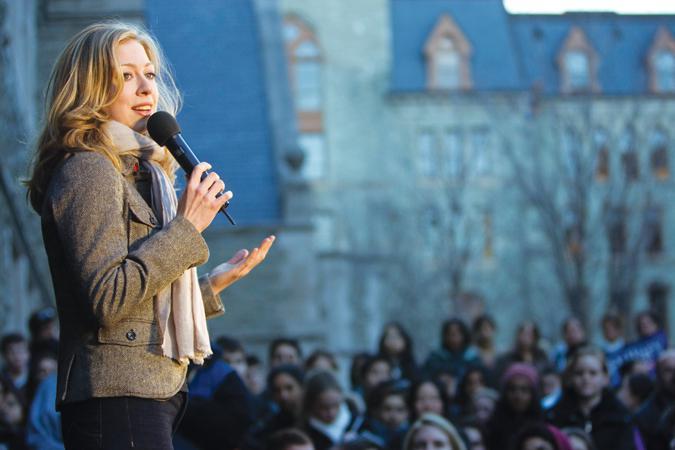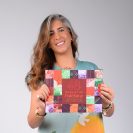So Chelsea Clinton walks into a room…and works it like a professional. There’s no joke there, just a bit of surprise. Recently, your bazaar correspondent checked in to see what the latest going-on’s were for the girl often best remembered for being in her awkward teen years while her father held—and struggled to hold onto—America’s highest office. First, a realization: if we are not seeing a future politician in the making, I will eat this months’ entire magazine: mark my words, Kuwait! Give it 20 years and we all shall see: she’s poised, she’s polished, she’s articulate to a point that would make you feel dumb, were she not also so inclusive in her tone. And to be honest, I wasn’t that interested in coming to hear her speak. Judging that I am one of a handful of guys in a group of 400+ girls, the room has all the makings of a feminist pep-rally. Her message however, in her role as part of the Clinton Foundation, was one of pure engagement and an active commitment toward creating change-agents for a better global tomorrow.
Over the past 12 years, the Clinton Foundation has built partnerships with great purpose among governments, businesses, NGOs, and individuals everywhere to strengthen health systems in developing countries, fight climate change, expand economic opportunity in Africa, Latin America and the United States, and help Americans live healthier lives. Additionally, Clinton Global Initiative members have made more than 2,800 Commitments to Action to improve more than 430 million lives in more than 180 countries. That is a hefty starting point for any organization, but seems more like preamble to greater change for this one.
In Chelsea’s role as Vice Chair of the Clinton Foundation she focuses especially on the Foundation’s health programs, including the Clinton Health Access Initiative, which strengthens health care and access to lifesaving services in the developing world; the Alliance for a Healthier Generation, which fights childhood obesity in the United States; and the Clinton Health Matters Initiative, which addresses preventable disease in the United States. She also established – and continues to lead – the Clinton Foundation Day of Action program, which identifies and organizes meaningful service opportunities for Foundation staff, friends, and partners and for the wider Foundation community.
The entire basis of the conversation tonight splits between a binary thought: things that inspire her, and things that anger her. In this case she begins with the latter and opts to talks about what she considers to be “unthinkable in our times,” most of which for her includes access to health care, primarily for the youth of the world.
One primary focus at present for the foundation is working to eradicate childhood diarrhea as a cause of death by dehydration (not without a few small chuckles from a young-ish crowd, a point she again shrugs off with a tacit acknowledgment and moving on—like a champ). At the Clinton Foundation they are trying to fix this dehydration problem in two different ways: 1) by changing the market dynamics around hydration solutions and zinc supplements, which are the main ways to treat dehydration so that children do not die from it, and 2) by lowering vaccine prices. They feel that they, using some of her father Bill Clinton’s previous successes as a model with anti-viral medication, have proved they can change that market from a high price low volume structure to one that shifts to low price high volume, as they are things that everybody needs.
That’s a paradigm they have taken to scale in many other health commodities and are focused on recreating in this regard. As for the scale of the problem she notes that currently more than 750,000 kids every year die of complications from diarrhea. Most places in the world that suffer from what is referred to as a “high diarrheal burden” either don’t have the resources to invest in fighting it, or the powers that be don’t seem to place enough emphasis on solutions at present. So she sees their work as the intermediary to help in this regard. This is a path that has proved successful for them many times over.
She says that they are open-sourced in what they do, so if you wanted to pitch getting something done with their organization, or work in conjunction with them to adopt a local model in your own community, check with them. They have already partnered with people in Mexico, Indian Sub-Saharan Africa and many other places. Notably too is that their projects are always headed up locally by someone who is native to the country they are in. She finds that many of the problems with helping abroad is when there is not a respect for local context when trying to help, or when people try to apply a blueprint that may not otherwise fit. This is why local people are so important in this regard. So they partner with local governments as long as they are able to, and they leave when they are asked to leave.
As for how she goes about changing things, and encouraging words for those around her that are equally concerned, she says she has a simple metric: “First I figure out what makes me angry. Then I set about doing something about it.” For now, she is working to make immediate pragmatic changes via the Clinton Foundation, and working to inspire change agents through talks such as this one. As for what you can do to help, she says they always need volunteers (and especially ones who love analyzing data) who care about their initiatives around the world and cites “smart, motivated young people” as the way to do it. They have a year-round internship program, by the way, which accepts applicants three times a year. So for those of you looking for a way to get involved either locally or globally, find them online for ways to help. All in all, she is an inspiring speaker with a pragmatic plan for changing some of the many things that ail our modern global landscape.
Find them online at www.clintonfoundation.org.








